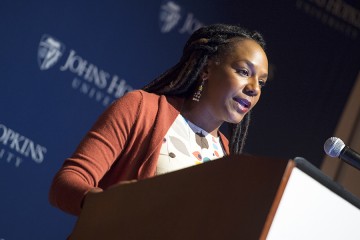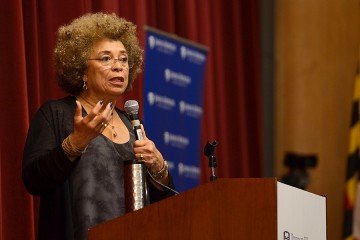The JHU Forums on Race in America are returning for the 2016-17 academic year with a panel discussion titled "The Next 50 years: Black Power's Afterlife and the Struggle for Social Justice," featuring Robin Kelley, Dayvon Love, and Salamishah Tillet.
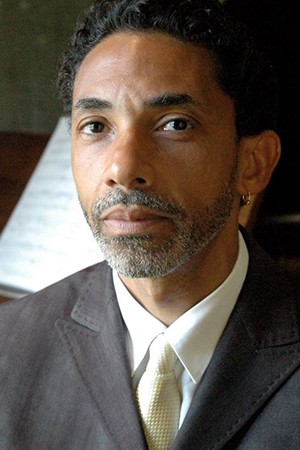
Image caption: Robin Kelley
The event, at 7 p.m. on Sept. 27 in Shriver Hall, will draw on the three panelists' expertise in African-American history, social activism, and political organizing. Nathan Connolly, an associate professor of history at Johns Hopkins University, will moderate the discussion with questions that consider the importance of black knowledge and experience in securing racial and economic justice in American politics and institutions from the 1970s until today.
"All three panelists have explored how black experiences of state violence and black ways of learning to avoid, interrogate, and contextualize that violence have proven instrumental to the development of (or simply hopes for) more just policies," Connolly says.
Writer and historian Robin D.G. Kelley is one of the country's most distinguished experts on African-American studies and a lecturer at numerous colleges and universities. He holds the Gary B. Nash Chair in U.S. History and African American Studies at UCLA and is a prize-winning book author and essayist on topics of race and history.
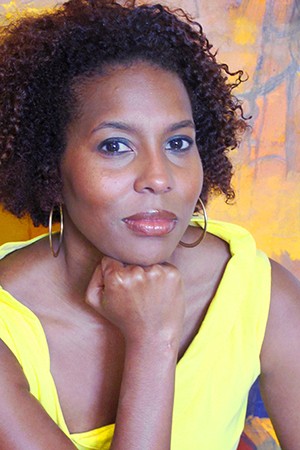
Image caption: Salamishah Tillet
Dayvon Love is a Baltimore-based political organizer and co-founder of Leaders of a Beautiful Struggle, a youth-led, grassroots think-tank that advances the public policy interests of black people. He now serves as director of research and public policy for that organization and promotes the idea that any group or campaign that sets out to fix policies that harm predominantly African-American communities—including those related to affordable housing, economic development, education, and criminal justice reform—must be led by African-Americans.
Salamishah Tillet is a scholar, activist, social critic, and media personality who has spent her career championing the rights and lives of the most invisible citizens. She has appeared on numerous television programs, published articles in national newspapers and magazines, and regularly contributes to The New York Times. Currently, she is an associate professor of English and Africana Studies and a faculty member of the Alice Paul Center for Research on Women, Gender, and Sexuality at the University of Pennsylvania.
The JHU Forums on Race in America series launched in spring 2015 when turmoil in U.S. cities, including Baltimore, turned a national spotlight on issues of race and racism. Those events lent urgency to the forums, which have since featured five speakers as they have sought to support an open, thoughtful, and informed community conversation.
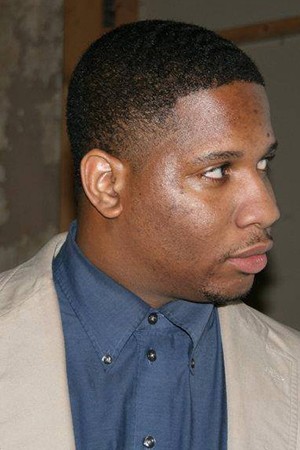
Image caption: Dayvon Love
"The hardships that inspired the uprising that struck Baltimore in April 2015 and the ongoing efforts to create a 'Roadmap for Diversity' at Hopkins require, among other things, acknowledging, working through, and actively preventing African-American encounters with racism," Connolly says. "There's a history to this. Civil Rights legislation intended to secure African-American equality created the legislative foundation for our present day multiculturalism. Now, in recognizing the limits of institutional multiculturalism, we've witnessed the emergence of several new black movements, including the #BlackLivesMatter Movement.
"These efforts represent, in effect, a BlackThoughtMatters movement," he adds, "one that, if engaged creatively and courageously, can help institutions like Hopkins and cities like Baltimore respond more promptly to racial and economic injustices and challenges."
Sunil Kumar, provost and senior vice president for academic affairs, said in a message to the university community: "As I begin my tenure as the university's provost, I am impressed by the lineup of scholars and activists who have participated in the forums since they began in spring 2015. I invite you to be a part of this open, thoughtful, and informed community conversation about racial inequality and deep divisions that exist in our society."
Information about the event is on the JHU Forums on Race in America website. There is no cost to attend, but online registration is requested.
Posted in University News, Voices+Opinion, Politics+Society





